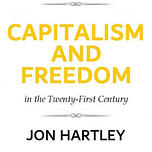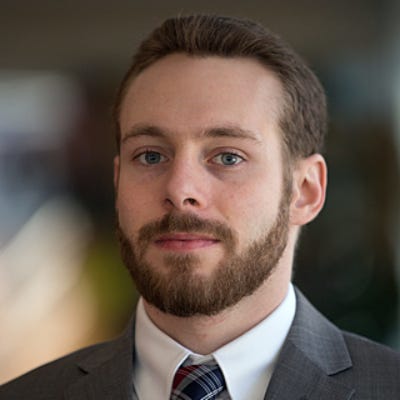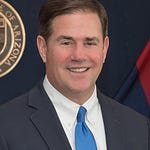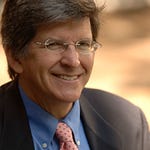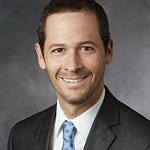Jon: “Welcome back to the Capitalism and Freedom in the 21st Century podcast, where we talk about economics, markets, and foreign policy. I'm John Hartley, your host. It's September 2021, and we're fortunate to welcome Robert Orr on the podcast today. Robert is a policy analyst at the Michigan Center, where he focuses mostly on health care, welfare, and labor market policy. He's released a new report at Michigan called Unmatched, Repairing the U.S. Medical Residency Pipeline. Mr. Friedman spoke a lot on Medicare residencies in his 1962 book Capitalism and Freedom. In his chapter on occupational licensure, he tried the American Medical Association for creating a doctor shortage. Talking about occupational licensing seems to be very prescient today, given its renewed focus today in many areas of the labor market. Well, first of all, Robert, welcome, and thanks so much for joining us.”
Robert: “Thank you. Thank you for having me on.”
Jon: “So what is the history? Tell us a little bit about what the history of medical residencies are in the U.S. How long have they existed? Have they always been funded by Medicare? Is the residency model pretty specific to the U.S.? Do a lot of other countries have residency systems as well, or do they work very differently in terms of how they train doctors up or medical practitioners up to becoming fully licensed?”
Robert: “Sure. So we have residencies back into the 19th century, but the modern residency system that we think of today really started after World War II. During that period, the government actually was interested in financing a large expansion of the domestic medical supply. So they funded a bunch more former soldiers to go through medical school. And out of that, we get the sort of modern residency system where hospitals sort of use these people as a form of cheap labor. And at some point, during the 50s, 60s, and 70s, gradually, higher standards were implemented, and these people were working for actual wages. They were previously also working for free, just hoping for the opportunity that they could become a doctor one day. This system, at this point, was quite similar to how a lot of countries do residencies. They had a lot of what we call rotating internships, where you move between a couples of different hospitals, trying out different ways of medical practice. That's how it's done in a lot of the world. In the 1970s, the United States had eliminated these rotating internships, so now everybody was to go through a specialty. And in doing that, it made it a lot more expensive for the teaching institutions, who used to be getting a great deal on residencies oftentimes, to make it a net financial gain for them, offering that training.”
Jon: “Fantastic. And so this started around the same time as the GI Bill was increasing and increasing college enrollment in the U.S. How did it really change around the 90s with this cap on the total number of medical residencies that Medicare funds each year? And how has that changed since the 90s? And do you think that has contributed in some way to creating something like a, quote, you know, doctor shortage, which we hear about sometimes?”
Robert: “Sure. So starting in the 1980s, a reduction in the number of U.S. physicians was very much engineered by policymakers. A lot of the time, they were worried that too many doctors were causing unnecessary care. And so starting in 1980, we started getting these reports saying, we've got to decrease the number of doctors in this country. That started as sort of a gradual process of decreasing the generosity of public funds. At the same time, the MD Medical School had instituted a moratorium on the number of doctors who could graduate each year. And so this sort of government and nonprofit actions were brought into this idea that the United States had too many doctors. And this culminated in 1998 with the balanced budget, which capped the number of Medicare-funded presidencies, freezing the geographic distribution exactly where they were, and severely limiting the ability to finance presidency programs in this country.”
Jon: “Fascinating. We hear a lot about how this so-called doctor shortage is somewhat regional, arguably in rural areas there are fewer doctors. I'm curious, is this primarily in primary care that this shortage tends to exist? How has the state of the doctor labor market really changed since Friedman originally wrote in 1962? I remember then he wrote, I think famously, about how there might be doctors driving cabs, and that the American Medical Association played a big role in creating the doctor shortage. How has the AMA, the American Medical Association, and its influence changed? And is it other groups now, like, for example, AAMC or medical schools, which have more power now?”
Robert: “Yeah, so on your political sort of economy point, the AMA's current role in the doctor shortage, I mean, they're a significantly less powerful organization than they were in Friedman's era. In Friedman's era, they were literally threatening people, incredibly threatening people who tried to set up insurance systems. And so they're not the same sort of beast they were in terms of threatening people and general corruption.”
Jon: “I think they were often referred to as like a doctor union almost, a union for doctors at some level, I think is what Friedman and others at once referred to them. But now I guess that there's some of these other groups like AAMC and others that seem to be driving the bus now on this.”
Robert: “Yeah, I don't think that it's really that there's even one group you can blame. I think it's that it's a lot of different. There's a lot of different interests in the health care space. Everybody is sort of locked into these systems that nobody can really unilaterally change. And so, despite them being less than ideal, there's nobody really in the place of authority to say, you know, we've got to scrap all of the residency accreditation rules. They're good, but they're not working. Or we need to massively increase the number of residency accreditations that we have.”
Jon: “So, fast-forwarding from Friedman's time, 1962, to today, would you say that, you know, do you think that doctor's origin is a lot worse now than it was back then? And do you think Friedman was sort of prescient in this way? And would you agree with the statement that it's primarily a regional issue and primarily focused in primary care? Or are there some other areas of medicine where this is an issue as well?”
Robert: “Sure. I'd say that it is certainly especially bad in primary care and rural America. Our current residency system does a lot to actually encourage that. There's some pretty clear biases in the funding formula work that certainly haunts rural America. It's certainly detriting primary care services.”
Jon: “Fantastic. You've written this fantastic report, which I highly recommend all of our listeners here take a look at. Really fantastic gain into the history of enough residencies in the U.S. And has a lot of really great ideas when it comes to reform. What are your top ideas for reform here with residencies?”
Robert: Sure. A lot of these fundings are pretty broken. They were designed with the assumption that basically we shouldn't have more doctors in this country. We can think of the cap on Medicare funded spots in particular. And there's about seven different funding streams. I'd consolidate all of those and basically pay it out on a per-residence basis to each hospital without any cap for each residency I have. This gets rid of these geographic biases. And I'd also boost it in the initial year, lumped into the later years. In order to basically incentivize the creation of doctors more efficiently and to benefit the primary care, to have shorter residencies, for example.”
Jon: “Go ahead. Go ahead. I mean, it seems like there's just so many different supply-side sorts of issues in health care. You know, we talk a lot about, you know, scope of practice, as well as what we see in nurse practitioners, allowing them with their licenses to be able to perform, you know, to the top of their license. We have things like physician assistants, and, you know, each of these types, you know, whether you're an RN or a registered nurse or, you know, you're a physician assistant, you're somewhat limited in some of the things that you can do. And I think that there's been a lot of reform proposals, but I've also argued that, you know, one other way on top of, you know, residency reform, you could also sort of allow nurse practitioners and physician assistants to sort of subsume the role that primary care physicians play by allowing them and changing sort of the limits of their licenses. I think that's been sort of another idea as well to sort of expand sort of the labor supply, if you will, in primary care by relaxing some of this occupational licensing that exists within medicine. So here's just sort of an idea, like getting back to residencies here. Say Congress did something radical, maybe. What Friedman would have wanted, and just defunded Medicare graduate medical education, GME residencies altogether. What do you think would happen? Would private hospitals then step up to pay for them? Or would residencies just disappear altogether? We think about becoming a doctor. This is a very long timeframe being an intern, doing a residency for several years. Some people might argue, that maybe that's not an efficient system. Private hospitals should be paying for this training instead, and would maybe do it more efficiently. One, do you think that this model of one year internship and multi-year residency, do you think that that's necessary? And what do you think would happen if there was some sort of push to change or to sort of remove government, if you will, subsidies that exist for this? What do you think would happen? And I'm just curious to get your thinking on this. And obviously that would be a very radical sort of thing, but I'm curious more about the structure of Medicare-funded residencies in general.”
Robert: “Yeah, so first of all, I think that this is a—fixing the residency funding system is complementary rather than competing with scope of practice reform. I see that doctors and—or physicians, assistants, and nurse practitioners could play a more expensive role here, no doubt, but at the end of the day, we're going to need doctors and nurse practitioners have a long, long way to go until there are numerous enough to replace doctors in primary care. And given the sort of broader shortage that a lot of places have in terms of medical services, we can't really wait for that to happen. Sort of on your thought experience on what would happen if we just got rid of funding, well, it would certainly be a crisis point for the system. The current way that—the current educational requirements for residents, at least in the first year of their sort of tenure as a medical resident, is not generating positive revenue for these hospitals, given the fixed costs and educational requirements and the time that doctors who could be generating revenue, treating patients, have to invest in teaching. The system has very much come into crisis. You know, you could see it unraveling in a few different ways. One way to sort of make it work would be to have medical residents start taking out student loans for residency training. I don't know if I've been too happy about that. On average, $240,000 in medical school debt already. You could see just that the United States just muddled through and just wouldn't be able to provide the same level of care, just because the institutions simply would be just too stuck in their ways to change. You can also imagine that. I don’t think that there’s a straightforwardly good story you can tell if you just—if under-residents are going to be there.”
Jon: “Interesting. Yeah, now, I think education financing is, you know, very, you know, ultimately this is, you know, education. You know, we kind of think of, you know, residencies as partly like jobs, but ultimately it's almost like an apprenticeship type of education. And it's interesting that, you know, I think, you know, on the post-secondary ed reform side of things, there's a lot of interesting things that we often, obviously there's, you know, the student debt crisis there, and adding more student debt on top of the medical school debt, you know, would be almost even more burdensome here. But I guess you do have things like income share agreements, you know, that's also a Milton Friedman idea, and, you know, a different chapter in capitalism and freedom, and, you know, certainly, you know, perhaps income share agreements would look well in medical school."
Robert: “On that, I actually thought, you know, one way you could fund it is if you mandated, you basically mandated income share agreements among doctors, wherein that was the funding mechanism for the regular PCC, as long as they're talking about hypothetical ideas, that could completely work if you were able to disperse all the doctors into the same pool.”
Jon: “Absolutely. It's fascinating. I mean, just think about, I guess, how, you know, different ways in which you can fund education. I think about, you know, PhD programs, you know, sort of interesting, you know, similar sort of apprenticeship sort of thing. But obviously, you know, I mean, a lot of departments, certainly in graduate education, you know, the PhD programs meet funding challenges all the time. And, you know, certainly something like medical training is, you know, obviously an extremely important educational investment. So interesting thoughts and ideas there in terms of, you know, different ways in which you could potentially fund this sort of medical training. Just thinking ahead here to the future and thinking about the future of medicine over the next century, is there any way, Robert, in which you think AI might impact or disrupt medicine in the future to the point where the demand for medical residencies and the nature of medical training might change, whether it's, say, making more accurate diagnoses or assisting doctors making more accurate diagnoses or robots or machines being more involved in medical procedures? What do you think the future of medical education and medical practice looks like?”
Robert: “Sure. I think there's lots of opportunities for AI to contribute in the biomedical industry. So thinking healthcare broadly, you can see it. Robots being deployed more for surgical procedures. The real, sort of, untapped gains are just basically implementing the advances from the pre-AI, like the information revolution. So much medical knowledge is on the internet that previously had to exist in doctors' heads at basically any given point to diagnose and treat the patient. I think that we can give it a so utilizing, or empathizing, in our residency training, much more people skills rather than rote knowledge and memorization which traditionally has been sort of the most important trait that a doctor could have.”
Jon: “That's fascinating. It's so interesting to think about how medicine will change over the next century. It's amazing just how prescient Friedman was in Capitalism and Freedom, talking about occupational licensing, talking about medicine, the doctor shortage, and how relevant that seems to be today with this fascinating discussion about the state of medical residencies which are funded by Medicare in the U.S. and are currently still capped, and also thinking about all these other licensing issues, whether it's scope of practice laws and allowing registered nurses or physician assistants to be able to perform more types of services that doctors are able to provide, and also thinking about things like certificate of need or common laws that would allow relaxing. Those would allow more hospitals to be built. There are effectively laws, state laws, that prevent more hospitals from being built, and slowly those are being repealed. All very fascinating, very interesting topics when we think about why it is that health care is so expensive, why we have what you could call sort of a cost of living crisis in the U.S., and certainly U.S. medical care is much more expensive compared to the rest of the world. All right, thanks so much, Robert, for joining us here. I highly recommend all of our listeners to check out his new report on medical residencies at the Michigan Center website. That's all the time we have for today. This is the Capitalism and Freedom in the 21st Century podcast. Thanks so much for joining.”
Robert: “Thank you for having me, Jon.”


